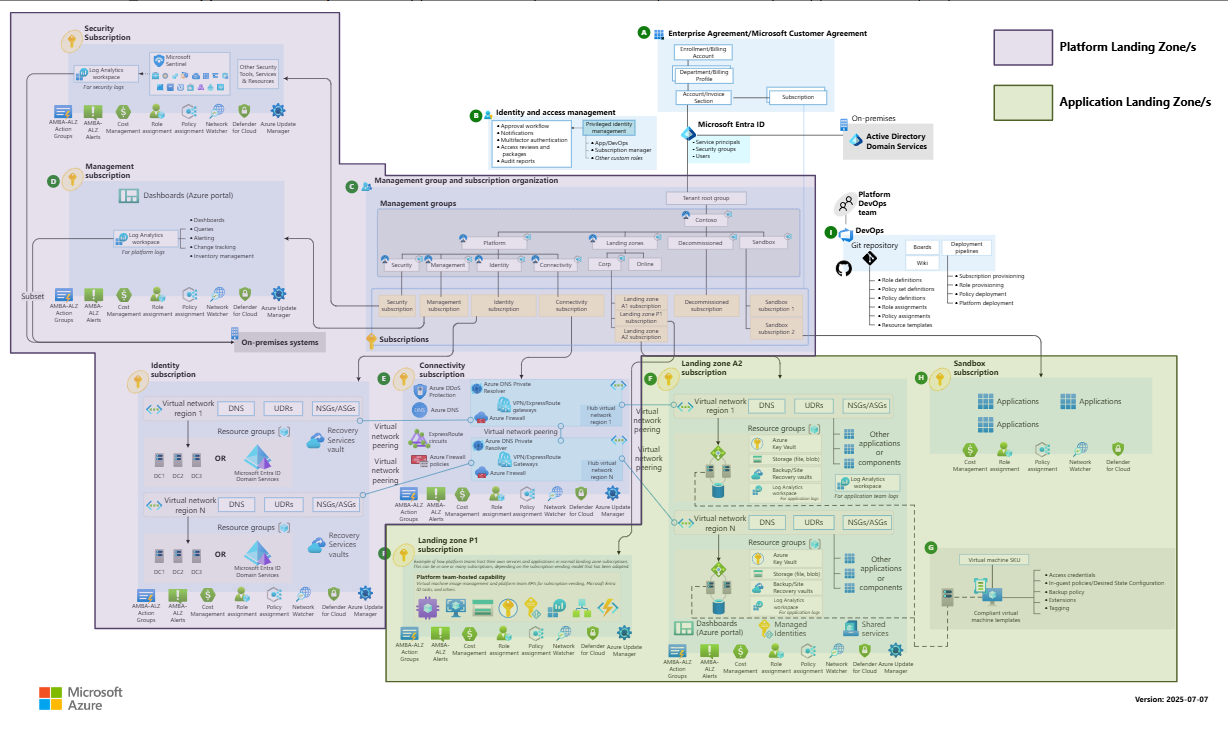Gestión de Código para Landing Zones con GitHub y Terraform
Introducción
La gestión eficiente del código de una Landing Zone es crucial para mantener una infraestructura escalable y segura. En este artículo, exploraremos cómo organizar y gestionar el código de una Landing Zone utilizando GitHub y Terraform.

Estructura del Repositorio
landing-zone/
├── environments/
│ ├── dev/
│ │ ├── main.tf
│ │ ├── variables.tf
│ │ └── terraform.tfvars
│ ├── staging/
│ └── prod/
├── modules/
│ ├── networking/
│ ├── security/
│ ├── governance/
│ └── baseline/
└── pipelines/
├── terraform-plan.yml
└── terraform-apply.yml
Módulo Base de Landing Zone
# modules/baseline/main.tf
module "resource_groups" {
source = "../resource-groups"
environment = var.environment
location = var.location
tags = var.tags
}
module "networking" {
source = "../networking"
resource_group_name = module.resource_groups.network_rg_name
address_space = var.address_space
environment = var.environment
}
module "security" {
source = "../security"
resource_group_name = module.resource_groups.security_rg_name
environment = var.environment
}
GitHub Actions Pipeline
# .github/workflows/terraform-apply.yml
name: 'Terraform Apply'
on:
push:
branches:
- main
pull_request:
jobs:
terraform:
name: 'Terraform'
runs-on: ubuntu-latest
steps:
- name: Checkout
uses: actions/checkout@v2
- name: Setup Terraform
uses: hashicorp/setup-terraform@v1
with:
terraform_version: 1.0.0
- name: Terraform Format
run: terraform fmt -check
- name: Terraform Init
run: terraform init
- name: Terraform Plan
run: terraform plan -out=tfplan
- name: Terraform Apply
if: github.ref == 'refs/heads/main' && github.event_name == 'push'
run: terraform apply -auto-approve tfplan
Control de Versiones y Branches
# Estructura de branches
main # Producción
├── develop # Desarrollo
├── feature/* # Nuevas características
└── hotfix/* # Correcciones urgentes
Gestión de Secretos
# .github/workflows/secrets.yml
name: 'Secrets Management'
env:
ARM_CLIENT_ID: $
ARM_CLIENT_SECRET: $
ARM_SUBSCRIPTION_ID: $
ARM_TENANT_ID: $
Módulo de Políticas
# modules/governance/policies.tf
resource "azurerm_policy_definition" "allowed_locations" {
name = "allowed-locations"
policy_type = "Custom"
mode = "All"
display_name = "Allowed Locations"
policy_rule = <<POLICY_RULE
{
"if": {
"not": {
"field": "location",
"in": "[parameters('allowedLocations')]"
}
},
"then": {
"effect": "deny"
}
}
POLICY_RULE
}
Testing y Validación
# tests/main.tf
module "test_baseline" {
source = "../modules/baseline"
environment = "test"
location = "westeurope"
tags = {
Environment = "Test"
ManagedBy = "Terraform"
}
}
Automatización de Documentación
# Documentation Generator
terraform-docs markdown table --output-file README.md ./modules/baseline
Control de Costos
# modules/governance/cost_management.tf
resource "azurerm_consumption_budget_subscription" "main" {
name = "subscription-budget"
subscription_id = data.azurerm_subscription.current.id
amount = 1000
time_grain = "Monthly"
notification {
enabled = true
threshold = 90.0
operator = "GreaterThan"
contact_emails = ["team@example.com"]
}
}
